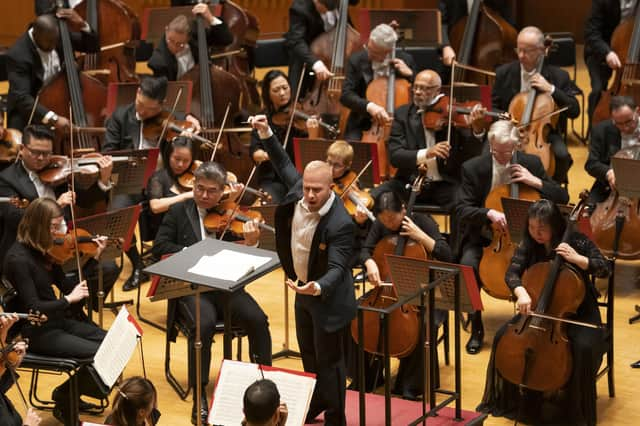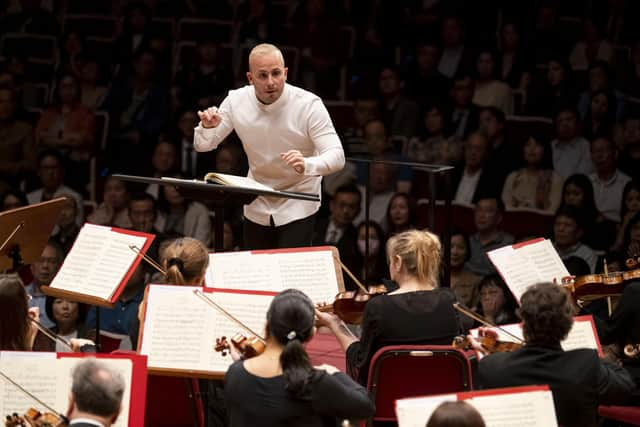Edinburgh International Festival closing concert: 'I think people will hear the joy'


The Edinburgh Playhouse is set to host a grand thank-you concert on Saturday 27 August, with free tickets for anyone who wants to be there – and the concert will also be beamed live to the Ross Bandstand in Princes Street Gardens. The sentiment is clear: this is an expression of gratitude to Edinburgh and its residents for making the International Festival what it has been throughout its 75 years of existence. But it’s also a time for celebration – and few ensembles, surely, can do that better than the Philadelphia Orchestra.
Thank You, Edinburgh marks the culmination of a four-concert residency for the Philadelphia Orchestra at the Festival, and also the beginning of a major European tour for the orchestra. “We’re so happy we can stay in the city for a few days, so we don’t have to pack and unpack every night!” laughs Philadelphia’s concertmaster, David Kim.
Advertisement
Hide AdAdvertisement
Hide AdFor principal timpanist Don Liuzzi, it’s far from the first time he’s been to Edinburgh. “I used to play in the Pittsburgh Symphony, and we did a couple of residencies at the Festival back in the 80s. Boy, I have some of my fondest memories of those times – as a young, single person, it’s not a bad place to be when the Festival’s happening.”
Not only is it one of America’s famed “big five” orchestras, the Philadelphia Orchestra is also one of its most distinctive. Not for nothing was its fabled “Philadelphia sound” – lush, gleaming, full of disciplined precision yet brimming over with life and optimism – the stuff of legend in the 1960s, 70s and 80s. And the orchestra has taken on vibrant new life in the past decade under its current music director, Canadian firecracker conductor Yannick Nézet-Séguin (who also happens to be music director at New York’s Metropolitan Opera and Montreal’s Orchestre Métropolitain). He is also looking forward to his brief Edinburgh sojourn. “I love having time to settle into a city, and build bonds with audiences over multiple performances. I always love visiting Scotland – you’re part of my musical family.”
That musical family clearly extends out from Nézet-Séguin and his orchestra to the soloists they’re collaborating with, including Scottish mezzo-soprano Karen Cargill and Los Angeles-born soprano Angel Blue, both regular collaborators in Philadelphia, and both of whom sing in Beethoven’s Ninth Symphony at the orchestra’s first Usher Hall concert. “Obviously I’m not an orchestra member,” says Blue, “but I feel like I’m part of the Philadelphia Orchestra family, and I think I’ve become a better singer listening to them and working with them.”
“Our music director is a superstar, a real global artist,” beams concertmaster Kim. “And I’m delighted we can also perform with him in a more intimate setting.” Kim’s referring to the Philadelphia musicians’ chamber performance in the Queen’s Hall on 25 August, playing Mozart’s Clarinet Quintet and Piano Concerto No. 12 as a chamber work with Nézet-Séguin as soloist. It’s a rare chance to experience the conductor’s musicianship off the podium – for both listeners and his Philadelphia colleagues. “During the pandemic I had the opportunity to reconnect with the piano,” Nézet-Séguin explains. “It was very meaningful for me. To be able to share this side of my artistry with audiences in Edinburgh is extremely special. There’s a level of intimacy you gain as a soloist that enriches my role as a conductor.”
The centrepiece in one of the Philadelphia Orchestra’s earlier concerts, however, is a piece that’s likely to be far less familiar: the First Symphony by Florence Price. She has the rare distinction of being the first African-American female composer to have had a work performed by a major US orchestra (when the Boston Symphony Orchestra premiered her First Symphony in 1933). Since then, however, and despite a wide-ranging output, she’s been a woefully overlooked figure, despite the immediacy and attractiveness of her music.


That was, however, until the Philadelphia Orchestra championed her First Symphony. “Yannick really embraced the project of performing Price’s music,” says Kim. “He led the way wholeheartedly – from day one, he was fully committed. So we all bought into it, and for sure, it’s become part of our repertoire.” The result was a Grammy Award for the orchestra’s recording of Price’s First and Third Symphonies – but, arguably more importantly, the distinction of putting Price firmly back on the orchestral map. “It’s like discovering a part of America that we just didn’t know about,” adds Liuzzi.
And it demonstrates, too, a whole other side to the orchestra’s famously slick sound and infectious joie de vivre. Equally important for Philadelphia locals Kim and Liuzzi, they explain, are the orchestra’s projects engaging with under-represented communities, or acknowledging the Black Lives Matter protests, or paying tribute to Ukrainian resistance to the Russian invasion of their country.
Advertisement
Hide AdAdvertisement
Hide AdIndeed, it’s current global events that add a particular relevance to the Philadelphia Orchestra’s performance of Beethoven’s Ninth Symphony, with its joyful finale urging us to embrace brotherhood, liberty and equality. It’s a piece with which the orchestra ended its past season, also taking it to New York’s Carnegie Hall. “I’m right at the front of the orchestra, so I often look into the audience,” says Kim. “And I saw a lot of people wiping their eyes. And I’m so glad we’re going to be doing it with the Edinburgh Festival Chorus – that kind of collaboration is what the piece is all about.” Blue agrees: “In terms of where we are as a world right now, I don’t think there’s a better time for Beethoven’s Ninth. It’s definitely a poignant time for us to be performing the piece.”
So there are spectacles from the Philadelphia Orchestra to look forward to, no doubt, not least in the free Playhouse and Princes Street Gardens concert. But there’s also the opportunity to experience the visionary thinking of an orchestra and conductor who are clearly deeply considering music’s purpose, especially in the context of current events. “The world is kind of swimming in its own stew at the moment,” says Liuzzi. “But it’s still a hopeful time. This trip is going to mean the world to us in the Philadelphia Orchestra, and I hope to Edinburgh audiences too. I think they’ll hear the joy in what we’re bringing.”
Thank You, Edinburgh, Edinburgh Playhouse and Princes Street Gardens, 27 August. For full details of the Philadelphia Orchestra residency, see www.eif.co.uk